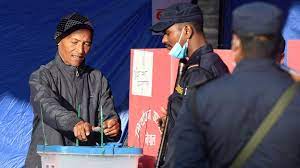Millions of voters in Nepal cast their ballot on Sunday to elect a new government, with rising prices, unemployment and political instability topping the agenda.
People stood in long queues to vote in the general election, which pits the alliance of centrist Nepali Congress party led by Prime Minister Sher Bahadur Deuba, against the Communist Party of Nepal – Unified Marxist Leninist, led by former Prime Minister Khadga Prasad Oli.
The Maoist communist party is fighting the election in alliance with the Nepali Congress party.
Nepal’s 275-member parliament and the 550 members of seven provincial assemblies are elected through a mix of first-past-the-post and proportional representation systems.
“I voted for economic development, ensuring jobs, food, clothes, education and health services,” said Rajesh Kumar Subedi, 52, who cast his ballot at a voting centre in Phaimlamchuli, a suburb of the capital Kathmandu.
After polling closed, Chief Election Commissioner Dinesh Thapalia said 61 percent of the country’s 18 million eligible voters had cast their ballots, according to preliminary estimates, down from the 68 percent seen at the last election in 2017.
“It is less than our expectations,” he said.
One person was killed in a clash during the voting, which was otherwise largely peaceful, Thapalia added.
Vote-counting
Vote counting in many places will start late on Sunday, the election commission said. It could take up to two weeks to declare the final results.
There were no pre-election polls, though political analysts expect the ruling alliance of the Nepali Congress and some former Maoist rebels to retain power.
Political stability has proven elusive for the poor nation, wedged between China and India, discouraging many investors. Nepal has had 10 governments since the abolition of a 239-year-old monarchy in 2008.
A new government will face the challenge of reviving the economy and curbing high prices at a time of fears that a global recession might reduce remittances, which account for about a quarter of the gross domestic product (GDP).
Tourism, which contributed four percent to GDP before the pandemic, has yet to fully recover. In the first 10 months of this year, roughly 450,000 tourists visited Nepal, less than half the number seen in the whole of 2019, before the COVID pandemic.
Foreign reserves are shrinking and the retail inflation rate has been hovering at six-year highs of about eight percent in the Himalayan nation, where one in five people live on less than $2 a day.
“We need political stability for faster growth of the economy and a government that can guarantee security to investors,” said Prakash Thapa, 25, another voter in the Phaimlamchuli suburb.

(Agencies)
Leave Comments